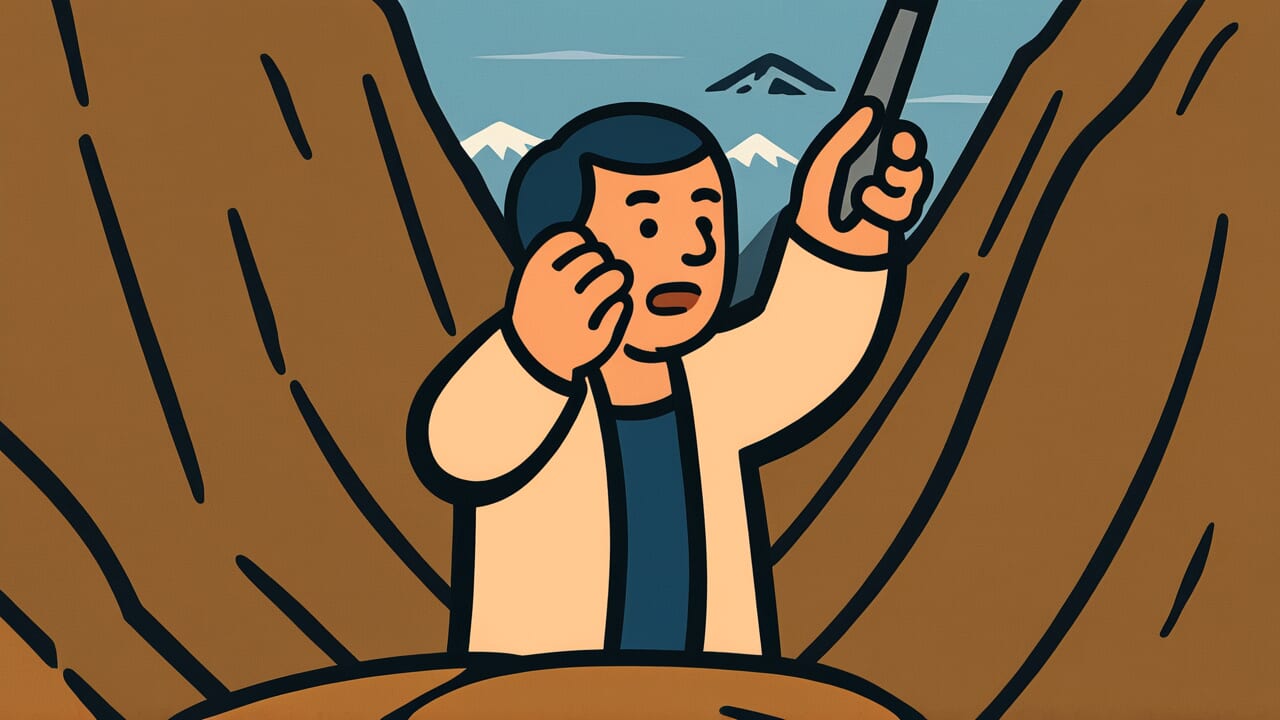How to Read “Toppling a great mountain with an awl and a knife”
Kiritō wo motte taizan wo otosu
Meaning of “Toppling a great mountain with an awl and a knife”
“Toppling a great mountain with an awl and a knife” means that even small efforts can achieve great results if you keep going. With tiny tools like an awl and a knife, you can bring down a massive mountain like Mount Tai.
In other words, no matter how weak your efforts seem, if you never give up and keep trying, you will eventually reach your big goals.
People use this proverb when they feel anxious about their limited abilities. They also use it when their goals seem impossibly far away. Today’s small step might seem tiny, but each step adds up and moves you forward.
This expression gives hope. Even in modern times, people use it to emphasize the importance of steady effort. They also use it to encourage themselves. It expresses faith in the power of persistence.
Origin and Etymology
This proverb likely comes from ancient Chinese classics. An “awl” is a thin tool for making holes. A “knife” refers to a small blade. “Taizan” means Mount Tai, a famous mountain in China.
Mount Tai has been worshipped as a sacred mountain since ancient times. Everyone knew its enormous size and dignity.
Can you really topple a massive mountain like Mount Tai with tiny tools like an awl and a knife? At first glance, this seems impossible. But this expression contains deep philosophy.
No matter how small your power is, if you focus it on one point and never stop, you can eventually move even a great mountain. This is the teaching.
Behind this idea lies the philosophy of “accumulation” that Chinese thinkers valued. Just as a single drop of water can bore a hole through rock over many years, human effort can make the impossible possible through persistence.
This proverb captures wisdom born from observation and experience.
After reaching Japan, this teaching continued to give courage to many people. When you feel like giving up because your power seems too small, this proverb tells you, “Don’t quit.”
Usage Examples
- If you study steadily every day, like toppling a great mountain with an awl and a knife, you will surely pass your target school someday
- We’re a small company, but with the spirit of toppling a great mountain with an awl and a knife, let’s gradually expand our market share
Universal Wisdom
The universal truth that “Toppling a great mountain with an awl and a knife” teaches is the greatness of human “power to persist.” We all experience moments when we feel crushed by how small our abilities are.
When the goal before us seems too large and our tools seem too small, we stand at the edge of despair.
But this proverb believes in human potential. It recognizes that humans have a special ability: “the power to do the same thing tomorrow that we did today.” One day’s effort may indeed be small.
But the power to continue that small effort for two days, three days, a hundred days, a thousand days—this is the weapon only humans possess.
Even in nature, the power of persistence is overwhelming. A river cannot carve rock in an instant, but over years and decades, it eventually cuts deep valleys. Plant roots cannot move stones in a day, but over time they can split massive boulders.
This proverb has been passed down for so long because people have confirmed this truth again and again. Only those who persist without giving up can move mountains in the end. Our ancestors understood this fact deeply.
When AI Hears This
The idea of toppling a mountain with the tip of an awl is surprisingly rational from a physics perspective. Pressure equals force divided by area. With the same force, the smaller the contact area, the higher the pressure jumps.
For example, a 60-kilogram person standing in shoes creates about 0.3 kilograms of pressure per square centimeter. But an awl tip has an area less than one ten-thousandth of that. So the same force creates pressure thousands to tens of thousands of times greater.
This pressure concentration is the key. Granite has a compressive strength of about 1,000 kilograms per square centimeter. But at an awl tip, stress locally exceeds this. Even more important is that rocks always contain microscopic cracks—invisible fissures.
If you repeatedly strike the same spot with an awl, these cracks gradually grow. In fracture mechanics, this is called “fatigue failure.” Repeated small forces gradually weaken the bonds inside the material.
In fact, modern stone processing uses a technology called “water jet.” When you pressurize a thin water stream, even soft water can cut through steel. The principle is the same. By concentrating energy on a tiny area, an apparently weak force transforms into power that can destroy massive objects.
The extreme contrast between awl and mountain actually captures the essence of physical laws.
Lessons for Today
What this proverb teaches modern people is “the courage to begin” and “the determination to continue.” We tend to wait until perfect preparation is complete. We postpone action until we have great power.
But this proverb says the small tool in your hand right now is enough.
Modern society demands instant results. If results don’t appear quickly, we judge that method as wrong. But truly valuable things take time to build. Language acquisition, skill improvement, relationship building—all are accumulations of small steps.
What matters is not dismissing today’s small step. That step may be small, but it is the first strike that topples the mountain. Tomorrow and the day after, keep taking the same small steps.
When you look back, you will be surprised at how far you have come. The mountain is already starting to crumble before your eyes.



Comments